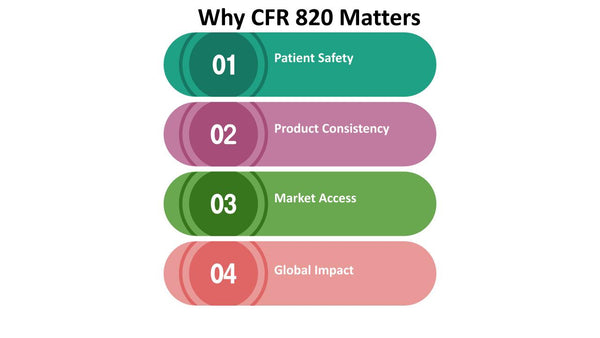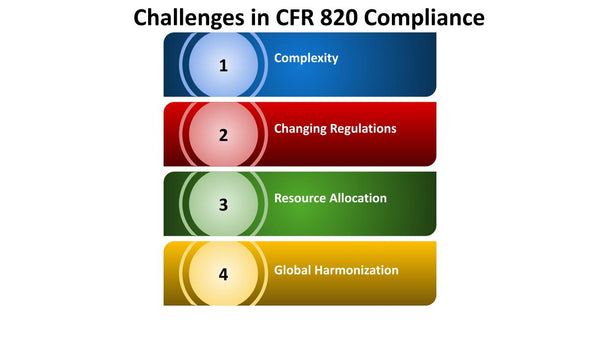Navigating CFR 820: Ensuring Quality and Safety in Medical Devices
The world of healthcare is built upon innovation, and at the heart of this innovation lies medical devices. From lifesaving implantable devices to diagnostic tools, these products play a vital role in patient care. However, with great innovation comes great responsibility, and ensuring the quality and safety of medical devices is paramount. This responsibility is enshrined in CFR 820, the Quality System Regulation (QSR) for medical devices. In this comprehensive guide, we will explore what CFR 820 is, why it matters, and how it shapes the landscape of medical device manufacturing and regulation.

Understanding CFR 820
CFR 820 stands for Code of Federal Regulations Title 21, Part 820. It is a set of regulations established by the Food and Drug Administration (FDA) in the United States to govern the quality management and manufacturing processes of medical devices. CFR 820 is often referred to as the Quality System Regulation (QSR), and it provides a comprehensive framework for ensuring that medical devices are safe and effective for their intended use.
Why CFR 820 Matters
- Patient Safety: The primary purpose of CFR 820 is to safeguard the well-being of patients. By enforcing strict quality control measures and manufacturing standards, CFR 820 helps minimize the risks associated with medical devices, such as device malfunctions or adverse events.
- Product Consistency: CFR 820 ensures that medical devices are manufactured consistently and meet predefined quality standards. This consistency is critical for healthcare providers who rely on the reliability and performance of these devices in patient care.
- Market Access: Compliance with CFR 820 is a prerequisite for bringing medical devices to market in the United States. Manufacturers must demonstrate that their products meet these stringent regulatory requirements to gain FDA approval.
- Global Impact: CFR 820's influence extends beyond the U.S. market. Many international regulatory bodies look to the FDA's QSR as a benchmark for medical device quality standards, making it crucial for manufacturers targeting a global audience.
Key Elements of CFR 820
To fully grasp the significance of CFR 820, it's essential to understand its key components:
1. Management Responsibility (Subpart B)
This section outlines the responsibilities of top management within a medical device manufacturing company. It includes requirements for management to establish a quality policy, designate a quality management representative, and ensure proper allocation of resources for quality control.
2. Design Control (Subpart C)
Design control requirements pertain to the development and design of medical devices. Manufacturers must establish and maintain procedures to ensure that devices are designed in a systematic and controlled manner, with a focus on meeting user needs and addressing potential risks.
3. Document Control (Subpart D)
This section emphasizes the importance of document control in maintaining accurate and up-to-date records related to the design, manufacturing, and testing of medical devices. It also covers procedures for document approval, review, and distribution.
4. Purchasing Controls (Subpart E)
Manufacturers are required to have procedures for selecting and evaluating suppliers, as well as ensuring that purchased components and materials meet specified quality requirements.
5. Production and Process Controls (Subpart F)
Subpart F details requirements for controlling the production and manufacturing processes of medical devices. This includes establishing and maintaining procedures for process validation, cleanliness, and monitoring.
6. Corrective and Preventive Action (Subpart J)
This section outlines the procedures for addressing non-conformities and implementing corrective and preventive actions to prevent recurrence of quality issues.
7. Complaint Handling (Subpart M)
Manufacturers must have procedures for receiving, reviewing, and evaluating complaints related to their devices, as well as reporting adverse events to regulatory authorities.
8. Quality System Records (Subpart P)
This section specifies the types of records that must be maintained to demonstrate compliance with CFR 820. These records serve as documentation of the quality management system's effectiveness.
9. Quality Audits (Subpart Q)
Manufacturers are required to conduct internal and external quality audits to assess compliance with CFR 820 and the effectiveness of their quality systems.

Challenges in CFR 820 Compliance
While CFR 820 is essential for ensuring the quality and safety of medical devices, compliance can be challenging for manufacturers. Some common challenges include:
- Complexity: CFR 820 is a comprehensive regulation with numerous requirements, making it challenging for manufacturers to navigate and implement all aspects effectively.
- Changing Regulations: Regulatory requirements can evolve over time, requiring manufacturers to stay up-to-date with the latest changes and adapt their quality management systems accordingly.
- Resource Allocation: Compliance with CFR 820 often requires significant resources in terms of time, personnel, and financial investments.
- Global Harmonization: Manufacturers operating in multiple international markets must navigate various regulatory frameworks, which can be complex and time-consuming.
Conclusion
CFR 820, the Quality System Regulation for medical devices, plays a pivotal role in ensuring the safety and efficacy of these critical healthcare products. It provides a comprehensive framework for quality management and regulatory compliance, emphasizing patient safety and product consistency.
Manufacturers in the medical device industry must recognize the importance of CFR 820 compliance and invest in robust quality management systems to meet these regulatory requirements. By doing so, they not only gain access to the U.S. market but also enhance their reputation globally as providers of safe and reliable medical devices.
In a rapidly evolving healthcare landscape, CFR 820 remains a cornerstone of quality assurance and patient protection, driving innovation while keeping patient safety at the forefront.

